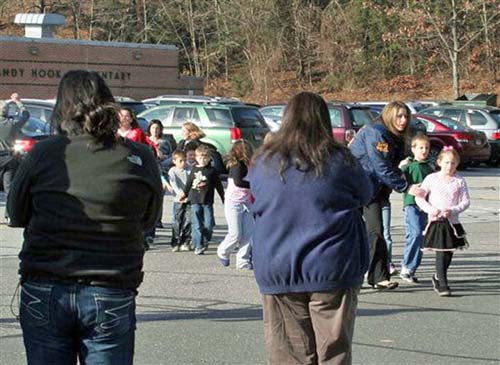(AP Photo/ Newtown Bee, Shannon Hicks)
What’s different about the Newtown Massacre? Not very much. On top of the Columbine tragedy, “The Dark Knight Rises” shooting and so on and so on, it still doesn’t even have its own Twitter hashtag. I haven’t had the heart to look for any theme music that has been drummed up for cable news.
Of course there are already countless reports among innumerable op-ed contributors. I can’t even use that angle. Nor can I exploit my use of the word “angle.” Nor am I much interested in “thinkers” from the world’s pundits and pulpits about what this means, if anything, about American society as a whole. I have no doubt, of course, there have been media roundups on how Fox News has covered the story.
The tragedy has dominated the airwaves this weekend, but the networks haven’t dropped many regularly scheduled prime-time weekend shows to make way for breaking news coverage. By now, however, the Sunday morning TV news talks shows have assembled their expert “panels” to speculate about the reasons for the deaths of 26 murdered people, 20 of them in grade school.

Is this a heartless, cynical way to appoach Newtown? No doubt it is. In my opinion, the most useful way to “analyze” is to recall reactions to similar incidents in the past. I would like to quote the following words from an article by me, as follows:
This is Ebert again, back in the present. I gather my point is what goes around, comes around.
“From his review of Gus Van Sant’s ‘Elephant’, a fictionalized account of a Columbine-like school shooting, here’s Roger Ebert on the media’s behavior while reporting these kinds of events:
“Let me tell you a story. The day after Columbine, I was interviewed for the Tom Brokaw news program. The reporter had been assigned a theory and was seeking sound bites to support it. “Wouldn’t you say,” she asked, “that killings like this are influenced by violent movies?” No, I said, I wouldn’t say that. “But what about ‘Basketball Diaries’?” she asked. “Doesn’t that have a scene of a boy walking into a school with a machine gun?”
“The obscure 1995 Leonardo Di Caprio movie did indeed have a brief fantasy scene of that nature, I said, but the movie failed at the box office (it grossed only $2.5 million), and it’s unlikely the Columbine killers saw it.
“The reporter looked disappointed, so I offered her my theory. “Events like this,” I said, “if they are influenced by anything, are influenced by news programs like your own. When an unbalanced kid walks into a school and starts shooting, it becomes a major media event. Cable news drops ordinary programming and goes around the clock with it. The story is assigned a logo and a theme song; these two kids were packaged as the Trench Coat Mafia. The message is clear to other disturbed kids around the country: If I shoot up my school, I can be famous. The TV will talk about nothing else but me. Experts will try to figure out what I was thinking. The kids and teachers at school will see they shouldn’t have messed with me. I’ll go out in a blaze of glory.”
“In short, I said, events like Columbine are influenced far less by violent movies than by CNN, the NBC Nightly News and all the other news media, who glorify the killers in the guise of “explaining” them.
The reporter thanked me and turned off the camera. Of course the interview was never used. They found plenty of talking heads to condemn violent movies, and everybody was happy.”












